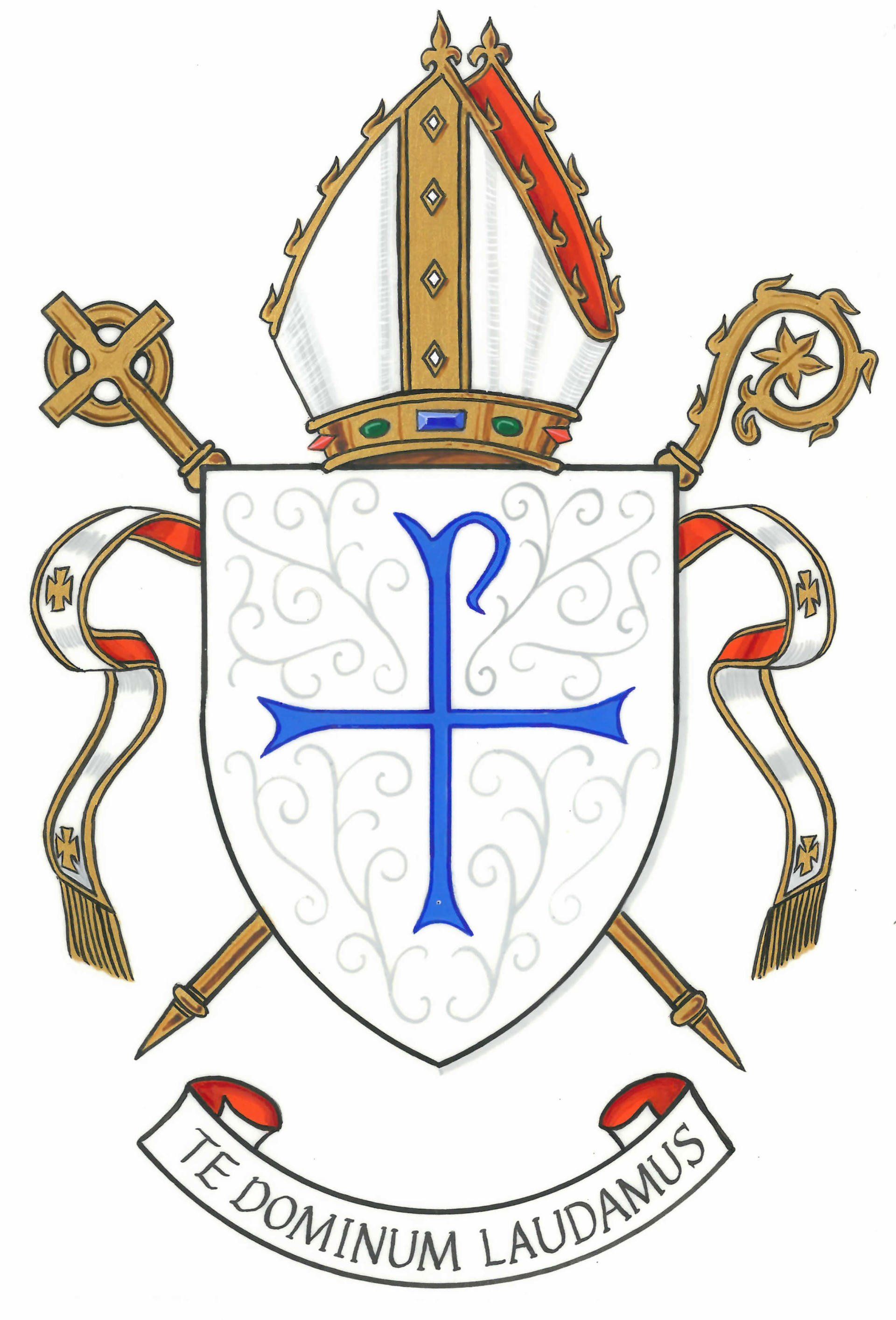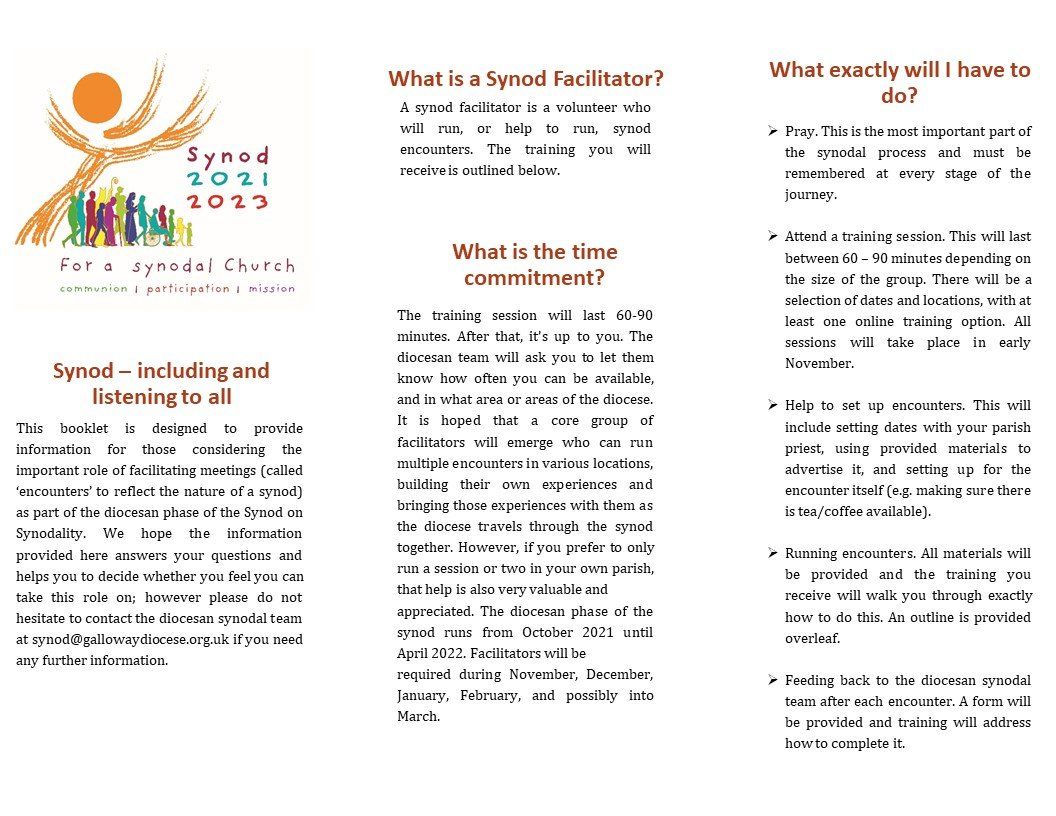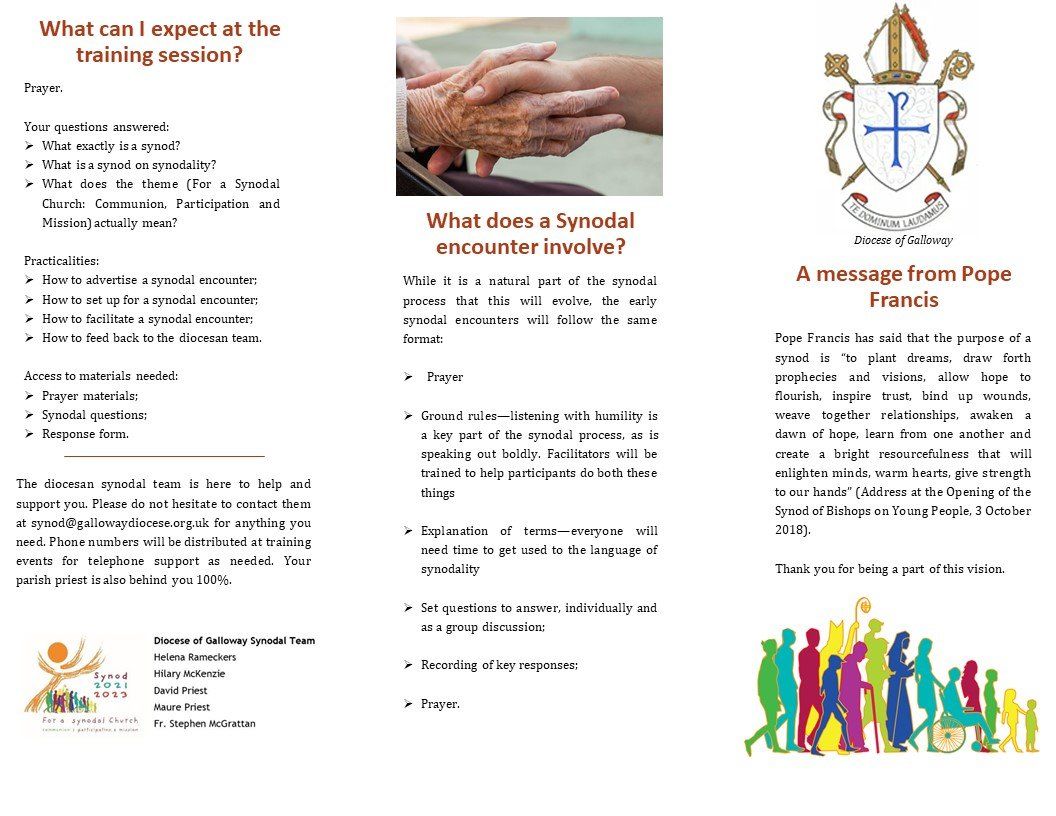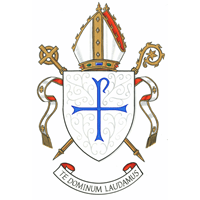SYNOD News
June 2022
The Diocese of Galloway Synod Synthesis Report is now available to download as a pdf here.
'Synodality' is about 'walking together'.
How is our 'walking together' in synodality realised today in the Church?
What steps does the Holy Spirit invite us to take in order to grow in our 'walking together'?
This is the fundamental question of the Synod. The ten topics provided by the Vatican to explore this fundamental question more fully are given below, with a short video reflection for each topic (created by Fr Stephen Latham) to help us all consider the key questions for each topic.
Please discuss them with your family members, and email the diocesan team at synod@gallowaydiocese.org.uk with any responses which you would like to share with us. If you wish to discuss these questions with people who no longer attend church or who have fallen away from their faith, this will be very welcome and should be done with the aim of listening to what they have to say, without seeking to try and make them understand your own point of view. The diocesan team will be pleased to receive all feedback on these questions, which will also be addressed during parish synod encounters in the coming weeks.
You can also complete the online questionaire which goes anonymously to the SYNOD team.
ONE - COMPANIONS ON THE JOURNEY:
The Acts of the Apostles tells us how the first disciples worked together under the guidance of the Holy Spirit to build the early Church. Pope Francis invites every baptised person to work - or 'walk' - together under the guidance of the Holy Spirit to build today's Church. You are invited to consider the following questions:
How are we already working/walking together?
How can we do this better?
Who is getting left behind and why?
TWO - LISTENING:
The first step in walking together is to really listen to one another, without prejudice or personal agenda. When we can listen like this, we may hear God’s voice speaking to us through other people. You are invited to consider the following questions:
How well do we listen, especially to people who have different views than our own?
How can we better listen to young people, women and minority groups?
THREE - SPEAKING OUT:
We are invited to speak out boldly and responsibly.
What helps us to do this?
What prevents us from doing this?
How does the relationship with local media work (not only Catholic media)?
How well do we choose the people who speak on our behalf to the wider community?
FOUR - CELEBRATION:
The celebration of the Eucharist—i.e. Mass—is at the centre of our Catholic communities, and forms the basis for our ‘walking together’.
How well do communal prayer and liturgical celebrations inspire and guide our sense of community?
How well do we allow and enable every member of the faithful to participate?
FIVE - SHARING RESPONSIBILITY FOR OUR COMMON MISSION:
Every baptised person is called to use their natural and supernatural gifts and talents to participate in the life and missionary service of the Church.
Do we understand what this means?
What stops us from giving our gifts and talents to the Church?
How does the Church community support its members who serve society in various ways (social and political involvement, scientific research, education, promoting social justice, protecting human rights, caring for the environment etc.)?
SIX - DIALOGUE IN CHURCH AND SOCIETY:
Dialogue requires perseverance and patience, but it also enables mutual understanding.
To what extent do diverse peoples in our community come together for dialogue?
How can we improve dialogue between our own communities, i.e. between parishes/deaneries, and with lay ministries?
What particular issues (in the Church or in society) do we need to pay more attention to?
How well do we dialogue with and learn from other areas of society, such as politics, culture, diverse groups; how can we improve?
SEVEN - ECUMENISM:
The dialogue between different Christian groups has a special place in the synodal journey.
What relationships do we have with members of other Christian traditions or denominations?
What are the benefits and difficulties?
How can we take the next step in walking forward with each other?
EIGHT - AUTHORITY AND PARTICIPATION:
A synodal Church is a Church where everyone participates and everyone shares responsibility.
How well do we identify our goals and how to reach them?
What good examples do we have of governance, teamwork and shared responsibility?
How do we promote lay ministries and the responsibility of lay people?
What fruitful experiences can we share of lay leadership?
How can we develop fruitful participation and leadership?
NINE - DISCERNING AND DECIDING:
A synodal Church makes decisions through discernment of what the Holy Spirit is saying through our whole community.
How well do we promote participation in decision making and how well do we make decisions together?
How can we improve our methods so that everyone’s voices can be included?
How can we grow in communal spiritual discernment?
TEN - FORMING OURSELVES IN SYNODALITY:
Synodality, that is journeying together, involves ongoing learning, and being open to change.
What do we need to help us to be more capable of ‘walking together’, listening to one another, participating in mission, and engaging in dialogue?
What training do lay leaders need to ensure they exercise their authority in a synodal way—i.e. that every member of the community is welcomed, respected and listened to?
Synodal Team
Helena Rameckers
Hilary McKenzie
David Priest
Maure Priest
Fr. Stephen McGrattan
email: synod@gallowaydiocese.org.uk
Vatican: www.synod.va/en.html
Useful Links
Contact Info
t: 01292 266750
e: administration@gallowaydiocese.org.uka: Diocese of Galloway, Candida Casa, 8 Corsehill Road Ayr KA7 2ST
Office Hours: Monday - Friday, 9am - 5pm (lunch 1pm - 2pm)
All Rights Reserved | Diocese of Galloway



